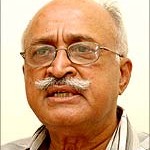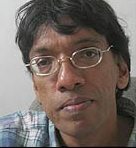–

Dharisha Bastians
Four years after the war ended, development and reconstruction showcases are eclipsed by raw human suffering during Navi Pillay’s visit to Sri Lanka
Rajeswari Ganesan, mother of a 28 year old Vavuniya prison inmate who died under suspicious circumstances in June last year, sobbed out her grief to visiting UN Human Rights Commissioner Navanethem Pillay in the North last Tuesday. This past year, Rajeswari’s grief over the death of her only son, who authorities claim died of a heart attack but she believes was killed in custody, has been a terrible thing to see. Navi Pillay may not have been able to understand Rajeswari’s representation made in Tamil, but overcome with empathy, the UN Envoy put her arms around the weeping mother and held her.
Navi Pillay was the most senior UN official to have visited Sri Lanka’s embattled north and east since the UN Secretary General, Ban Ki Moon toured the region soon after the war ended in May 2009. For hundreds of families living in the former war zone, whose personal tragedies have been ignored for years, the fact that a high ranking person of international influence was finally close enough to hear their cries for help, was undoubtedly an electrifying experience. “I have never experienced so many people weeping and crying. I have never seen this level of uncontrollable grief,” Pillay was to tell The Sunday Leader three days later in an interview.
Steps in the right direction
In anticipation of her visit, the Government made several strides in the right direction. Whether superficial attempts to pacify the visiting UN Envoy and temper her report ahead of the Commonwealth Heads of Government Meeting (CHOGM) scheduled for November or not, the Rajapaksa Administration set up a Commission on Disappearances, appointed credible commissioners, returned military acquired land to the people, promised action on the Weliweriya killings and agreed to give Pillay “unfettered access” wherever she chose to go. It was the first time that the regime had opened up the final theatre of war beside the now legendary Nandikadal lagoon to any foreign visitor.
Yet in the end, none of the Government’s efforts to paint a positive picture of Sri Lanka’s leap forward after the end of the war could mitigate the stark reality of weeping women and children on the streets of Jaffna and Trincomalee. Shiny new roads and railway tracks could not hide fundamental issues in the former battle zones that were obstructing genuine post-conflict healing and reparation. Pillay was confronted with tales of livelihood and land loss, the search for missing family members and justice for senseless death everywhere she went in the north and east. And in the capital, journalists and marginalised groups like the country’s Muslim population made representations to her about the ongoing suppression of fundamental freedoms in post-war Sri Lanka.
When the High Commissioner issued a stinging report of her seven day fact finding mission hours before she left the island, it was clear the representations of ordinary Sri Lankans and civil society groups had made a deep impression. There was no mincing of words or attempt to pacify the host government. Pillay hit back hard at her critics – many of them Government ministers and warned she would report any reprisals against those who had spoken to her during the UN Human Rights Council mandated mission, back to the Council.
Extended boldness
If Pillay’s presence had given ordinary people extraordinary courage to publicly air their grievances even in the heavily garrisoned north and east, her parting words that the UN considered reprisals a very serious matter has only extended this boldness. One day after the UN High Commissioner left Colombo, Fr. Veerasan Yogeswaran who runs a human rights group in Trincomalee that works with families of the missing or detained, told the French Press Agency (AFP) that he had been visited at midnight and again at dawn by half a dozen plainclothes policemen last Wednesday, just hours after his discussions with Pillay. The Jesuit priest told reporters that his concern was that security forces personnel were entering homes at midnight or in the pre-dawn hours and questioning ordinary civilians. Met with complaints by Pillay about the reprisals against the priests, journalists and civil groups, the Government vehemently denied the claim and then demanded the High Commissioner provide proof to allow the administration to commence investigations. It has lapsed into familiar arguments, about vested interests intimidating people in order to cast the Government in a bad light and even claimed the UN Envoy had been misled by mischievous political elements. But in other ways, the Government has already commenced its own public criticism of those who made representations before the UN High Commissioner, calling them out as tale carriers to the international community. Minister Wimal Weerawansa has already accused the Sri Lanka Muslim Congress of “snitching’ to Pillay because the Party handed over a report about violence against the Muslim Community to the visiting Envoy. President Mahinda Rajapaksa has also reportedly had strong words for SLMC Chief and Justice Minister Rauff Hakeem, about the move.
For Government officials heavily involved with organising Pillay’s visit, her final remarks at the end of the week long tour proved a deep disappointment. The sections of the regime that are advocating greater engagement with the UN system, including Ambassador Ravinatha Aryasinha who heads the country’s Geneva mission to the UN, genuinely believed that given the opportunity to witness the progress in Sri Lanka first hand, the UN High Commissioner’s perception of the human rights situation on the ground would change. Unfortunately these Government elements are at odds with other more powerful sections of the ruling regime, that are willing only to make superficial changes but have no real intention of meeting international obligations to devolve power to the island’s Tamil population or investigate alleged violations in the conflict’s final phase. Unfortunately for the Rajapaksa administration, Navi Pillay was not willing to merely scratch the surface during her visit.
Stinging goodbyes
As for Pillay’s last words in the island, no one is smarting more than President Mahinda Rajapaksa. The explosive statement at the end of her mission, included remarks about the authoritarian direction in which Sri Lanka was headed. Her words continue to rankle power centres in Colombo long after Pillay is gone.
“A dictator is a ruler who does not hold elections,” President Rajapaksa charged at the 62nd SLFP Convention in Kurunegala on Monday, one day after Pillay had left these shores. There had been 11 elections held under his watc, since 2005, he claimed. “What’s more democratic than that?” he asked the SLFP crowd. “What can I do if the Opposition Leader can’t win an election,” he quipped. Under the lighthearted tone however, the rancour is real, Government insiders say.
There is also the question of whether President Rajapaksa was deliberately perpetuating the grotesquely erroneous notion that elections are the sole test of a state’s democratic credentials. Deposed Iraqi Dictator Saddam Hussein, Egypt’s former President Hosni Mubarak, Zimbabwe’s President for life, Robert Mugabe and President Rajapaksa’s brand new best friend in Belarus, the self-proclaimed last dictator of Europe, Alexander Lukashenko all belong on a list of autocratic leaders who regularly take their nations to the polls. Elections held under such regimes are tragically flawed affairs. But even so, democracies are measured not merely by whether a country’s leaders are elected (however fairly or unfairly), but also by how a state and its leaders safeguard and uphold the liberties of individuals. In a state where civil liberties are suppressed, elections only impose majority tyranny on the rest of the populace.
The Government has issued rebuttal after rebuttal to Pillay’s statement. External Affairs Minister G.L. Peiris even addressed the press in London on Monday evening, in order to reply the UN Envoy as soon as possible. Each rebuttal has dealt extensively with Pillay’s remark on increasing authoritarianism, claiming that the comment was a transgression of her mandate and a political statement. Peiris said her concluding remarks showed a “distressing lack of balance” and claimed her observations suggested that Pillay had “formed her views before reaching the shores of the country.”
The floral tribute
The rebuttal of Pillay’s closing remarks from the Department of Government Information went so far as to accuse the High Commissioner of having attempted to pay a floral tribute at Mullivaikal where the LTTE Leader met his death. The UN Delegation it is learnt was notified by the highest levels of Government in Colombo last Tuesday while Pillay was in the North, that the tribute would not be tolerated.
During her press briefing in Colombo, High Commissioner Pillay said she often lays flowers in commemoration of victims of conflict, in most countries she visits. The question of the floral commemoration has become a hot button issue, with Government insiders insisting Pillay had “shown her hand” in no uncertain terms with the attempted ‘commemoration’.
Given the southern political sensitivities regarding the final theatre of battle where the LTTE leadership perished, the UN`s choice of Mullivaikal for a tribute was perhaps a poor one. But as analysts point out, despite the ubiquitous war memorials bearing unmistakably militaristic symbols all over the country, the Sri Lankan Government is yet to construct a memorial for all victims of the war, despite such a conciliatory memorial being strongly advocated even in the Lessons Learnt and Reconciliation Commission.
Nevertheless, for the first time since the High Commissioner’s delegation left Sri Lanka, her Office clarified the issue yesterday. Spokesman for the High Commissioner, Rupert Colville told Daily FT that the UN considered that the the general area where the war ended after nearly 30 years might be a suitable spot to commemorate all those who died during that conflict. Colville said that the Government had learned Pillay’s team was considering this and made it plain they viewed it in a different light. “We considered their point of view carefully and felt in the end that it might be misinterpreted — as indeed it has been — so decided not to proceed,” Colville said.
Gross misrepresentation
He said it was a gross misrepresentation to pretend that Pillay was planning to honour the LTTE. “She made her views on the LTTE very clear indeed in her statement,” the High Commissioner’s Spokesman told Daily FT. Colville said that the words High Commissioner Pillay was due to speak in Mullaitivu had been included in her final statement, when she paid her respects to all Sri Lankans around the country who were killed during the three decades of conflict.
He said that the misrepresentation was “just the latest in the pattern of mendacious abuse” Pillay had referred to in her closing remarks.
Needless to say the slurs cast at the visiting High Commissioner became a large part of the narrative, especially after Pillay tackled the issue head on in her closing remarks. According to informed sources, two remarks particularly irked the visiting UN Envoy. Firstly the reference to her by JHU strongman Udaya Gammanpila as a terrorist sympathiser who saw “her husband in every terrorist”. Pillay’s husband was a lawyer and anti-Apartheid activist in South Africa, imprisoned with Nelson Mandela and others on Robben Island, where political prisoners were detained. The second was Minister Mervyn Silva’s offer to marry Pillay to show her what Sri Lanka ‘has to offer.’ The lewd remarks, made worse by allusions to Ravana-Sita folklore drew an apology to the visiting High Commissioner from President Rajapaksa no less, during his meeting with her last Friday. For the 72 year old judge, who has fought relentlessly for women’s rights throughout her career and especially in her present position, Silva’s remarks were not to be borne.
During a meeting with Leader of the House Nimal Siripala De Silva who was briefing Pillay on the recently constituted Parliamentary Select Committee on Devolution proposals, tried to lightheartedly brush off Mervyn Silva’s slurs. “Don’t worry about his remarks,” the congenial De Silva said during the meeting. Pillay was quick on the draw: “It is you that should be worried, Minister” she said.
Making it personal
There is great weight in that brief but powerful sentence. Rajapaksa administration officials repeatedly make a fundamental mistake in its dealings with international diplomats. They attempt, at their own peril, to individualise UN office bearers or diplomatic officials at local missions. Navi Pillay, as far as the Sri Lankan Government is concerned, can be whittled down to a South African Tamil, a sympathiser of the Tamil cause by virtue of her ethnicity and a convenient tool of the West. Similar mistakes were made with her predecessor, Louise Arbour, who was repeatedly vilified by Government officials. Navanethem Pillay, the Government must understand, even at this late stage, is not just one woman to be discredited and ascribed terrorist labels. Pillay is not just a South African or a Tamil, but the holder of the Office of the High Commissioner of Human Rights at the UN, a fixed institution that will continue to advocate and criticise long after Pillay no longer holds the title. When she presents her reports on Sri Lanka following this fact finding mission, that report will not only remain relevant while Pillay remains in office, but even when her successor takes over the reins.
The UN Envoy said as much during her concluding press briefing last Saturday, when she explained that she and even the UN Secretary General were merely civil servants, bound to uphold the regulations and standards set by 193 member states of the UN. The rules, she said, were set by governments of the world, including Sri Lanka. “If the rules and regulations are violated, that is what the UN points out to Governments. You may call it criticism, but that is what the UN does. When there are gaps, we raise a critical voice, but always with the intention to help,” the High Commissioner told the Sri Lankan press corps. In essence, Navanethem Pillay does not make the rules, any more than Ban Ki Moon, Marzuki Darusman or Arbour does. This fundamental truth that the Sri Lankan Government fails to understand, despite the best efforts of saner counsel within the regime, gravely endangers the country’s international standing at forums such as the UN.
There is little doubt that High Commissioner Pillay’s report on Sri Lanka, to be presented orally in September and in full during the Human Rights Council’s March sessions, will be a bare-naked reading of the human rights situation on the ground. The Government has choices to make as it looks towards Council sessions in Geneva in March 2014, which foreign policy analysts repeatedly warn could herald the beginnings of a fully fledged international inquiry against Sri Lanka unless genuine steps are taken to address accountability issues between now and then.
Costing hearts and minds
Acknowledgement that the need to grant people freedom with dignity, protect human rights and the genuinely necessity to hold people to account for crimes committed against sections of the population not because the international community is demanding it, but for the sake of Sri Lanka’s own soul, could be a starting point, if the political leadership was so inclined. The lack of genuine commitment may have been where everything went wrong for the Government during the Pillay mission, despite all its best efforts to showcase progress. As human rights Chief, Pillay is less concerned with physical reconstruction and more focused on the human condition. The inability to understand that fundamental difference, is costing the Government hearts and minds in the former conflict zones and support in the international arena.
For Navi Pillay, the message came through loud and clear. Everywhere she went in the north and east and sometimes even in Colombo, ordinary people mobbed her with tales of their personal suffering. In the north, observers say, all focus has shifted from the Provincial Council election since Pillay’s visit, with ordinary people convinced again that the UN will successfully advocate on their behalf. Her presence inspired hope for civilians, families of the missing, journalists and human rights activists whose post-war reality has been far from peaceful.
“The fighting may be over, the suffering is not,” Pillay said, as she left Sri Lanka.
If it was paying attention to the more human factors of post-conflict rebuilding, the Government may not have had to endure the embarrassment of having Navi Pillay draw attention to the fact that the peace dividend will elude Sri Lanka as long as a section of its populace remains chained to the suffering wrought by brutal conflict. Sandhya Ekneligoda or Rajeswari Ganesan could have articulated the point with equal eloquence. It would have been apparent in the fear of thousands of ordinary Muslims, worrying that a violent day of reckoning may be in their future. Or in the prostate, uncontrollable grief of Sinnakutty Kanapathipillai from Mullaitivu, who lay on the streets outside the Jaffna Library, asking the UN High Commissioner to find her son who surrendered on 18 May 2009, never to be heard of again.
The compulsion to tell the world of their suffering is a direct consequence of the fact that at home, no one is listening.
Courtesy Daily FT





